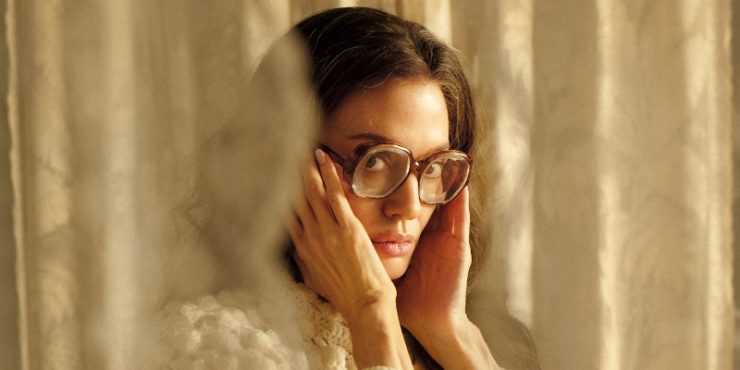Pablo Larraín makes remarkably interesting and unambiguously political films in his native Chile, but he’s most famous in the US for his now three biopics on Twentieth Century Women in Trouble. 2016’s Jackie explored Jacqueline Kennedy in the aftermath of her husband’s assassination, 2021’s Spencer followed Princess Diana as she attempted to traverse the many ghosts that haunt a royal English family. Now, Maria, a film about the opera singer Maria Callas in her final years. All three movies are touched by surrealism in soft, subtle ways, and all three are feasts for the eyes, not only in the casting of the beautiful women in the lead roles but in Larraín’s exquisite craft. Veteran cinematographer Edward Lachman is given permission to God mode in Maria and it’s unquestionably the best part of the movie.
As for everything else, I’m dubious. Angelina Jolie is cast as Callas who is spending her final week trying to recapture her former voice. Considering her health, the hope seems futile. Her butler (Pierfranceso Favino) tries to control her medication intake, which is ample. Her housemaid (Alba Rohrwacher) cares only to appease her beloved prima donna. She begins to hallucinate, and one of those hallucinations takes the form of a young reporter (Kodi Smit-McPhee), interviewing her about her life. The film’s script – written by Steven Knight – is pretty transparent. The unreal journalist gives us the opportunity to flash back to her glory days on the stage, performing Puccini like no other before or since. We also see the beginning, middle, and end of her rocky affair with Aristotle Onassis (Haluk Bilginer).
This all feels very turnkey, like typing in “Oscar biopic” into the world’s most sophisticated AI generator. Larraín feels like he’s trying to overcompensate for the mediocre script, framing each and every scene to its maximal artistry, but it feels hollow, without major dramatic substance or foundation. The movie only really works as an extended advertisement for Jolie, whose putting visible work into the part, even if it does ultimately feel like the work is all there is to see. She’s not exactly beating the accusations that she’s an actor who largely values technique and process over character. In the opera scenes, I was reminded of another awards season performance: Remi Malek in Bohemian Rhapsody. The resemblance comes in the obvious lip-syncing. Casting the star power of Jolie means having a lead who can’t actually sing. Well, if Malek still won the Oscar, I wouldn’t count out Jolie just yet. But at what cost?
My hopes is that this era of Larraín’s career is over. I can understand why audiences aren’t as taken with his Chilean films, but No, Neruda, Ema, and El Conde are all terrific movies with strong, earnest points of view that have very serious things to say about various serious topics. I love Spencer, but these biopics as a whole feel confectionery, and their defanged political perspectives are shocking when you see how passionately he argues in his Spanish-language films. The trilogy has raised his profile outside of the arthouse, and if anything else, it’s good to see a talented artist get more widespread recognition, but these films have crossed over into becoming vanity projects, cynical productions mounted to increase proximity to the Academy Awards. Maybe that’s not Larraín’s goal, but it certainly is Netflix’s, and it’s a little to on-the-nose.
Directed by Pablo Larraín










